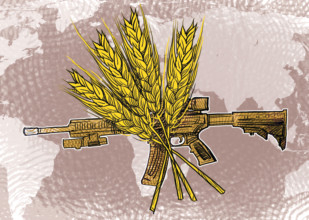
I recently returned from a vacation in the US, during which I read various newspapers, watched a number of cultural seminars and political debates and overheard people talking in restaurants. Even during intermissions at music halls, people conversed not only about the beauty of the symphonic compositions or the band’s performance, but also exchanged views on culture and politics, and intellectual and media-related topics.
These conversations revolved around Henry Kissinger’s return to the spotlight following a long hiatus. This followed statements published in the news and fiery televised debates on topics that concern those in the decision-making circles, the common man and political observers. Despite my keenness, I did not look into everything that was written or said by Kissinger, but he is not an irrational person, and what he says and thinks is in line with what is on the minds of America’s decision-makers. After all, he was a member of the 40 Committee and held the position of secretary of state during the terms of two US presidents. He handled the Arab-Israeli conflict dossier and backed the Vietnam War that led to massive losses. He continues to defend the interests of the rich and the American political elite, among others.
People in the US are talking about Kissinger’s book, particularly a memo in which he outlined America’s political strategy for the future. The memo, which was sent to the departments of defence and agriculture, and also the Central Intelligence Agency, says that the world will lose some of its key natural resources due to an increase in the global population, and in order to preserve these resources and prevent their misuse, they must be invested in a way that ensures their longevity, which therefore requires reducing population growth.
Kissinger proposes two ways for ‘depopulating the earth’, which he describes as a ‘humanitarian’ goal. Kissinger says that the US, some of its European allies and Israel must carry out this civilisational mission for a stable and prosperous world in which peace prevails. The first method he proposes is seizing control of food and energy supplies. Seizing control of food supplies will also pave the way for controlling people, while controlling energy will allow for control over nations. This means that food will be used as a weapon against the people and energy will be used to subjugate nations, particularly governments of Third World countries.
On my way back from the US, the plane flew over Saudi Arabia. The land was yellow and barren, void of any agriculture. Years ago, the same land had huge patches of green, with wheat being grown as far as the eye could see. Saudi Arabia was very successful in this regard, to the point that it began to export the surplus to Arab and other markets.
Still fixated with thoughts regarding Kissinger’s memo, I wondered what happened to Saudi Arabia’s wheat project. Referring to archives, the official reason was that groundwater in Saudi Arabia was being affected by wheat farming and therefore the country had to stop growing wheat in order to preserve groundwater, which is considered a more vital commodity in a desert country that does not receive much rainfall.
Spoiling the soil
However, is it not strange that a nation should stop growing wheat, despite having done it successfully in the past?
Saudi Arabia may not be the only country in the Middle East to stop growing wheat. Perhaps there are others who tried the same thing. Egypt, once upon a time, almost stopped growing wheat. The land allocated for wheat farming, to this day, does not meet the needs of the local market. Some studies hinted that some land in Egypt, which was suitable for farming, was ‘cancerated’ by wheat seeds imported from abroad, spoiling the soil. The problem was exacerbated by the use of harmful chemicals.
Which brings us to the key question: Is there an objective behind controlling the global supply of grains?
The reality is that grains, on a global scale, are already controlled. This control has been implemented using two methods. The first is through the intervention of influential world powers, such as the US, through established global organisations. The most prominent examples are the World Trade Organisation and the Food and Agriculture Organisation.
As for the grains, there are many studies that prove that the process of monopolising the supply happened long ago. There are companies that specialise in seed grains, exporting them to whoever desires to grow them in the land that they own, wherever they are. Upon closer inspection of the quality of the seeds, one discovers that those seeds can only be used for a single season. Farmers consume and sell their produce, but they also save some of the seeds so that they can plant them the following year. But the seeds exported by the aforementioned companies can only be used for one season and farmers will not able to plant them the next season. If one attempts to plant the wheat seeds again, they produce nothing, which makes farmers and countries that need it dependent on these companies every time they need to plant seeds.
Mohammad Hassan Al Harbi is a writer and journalist.












